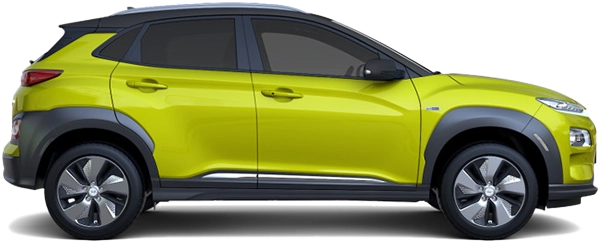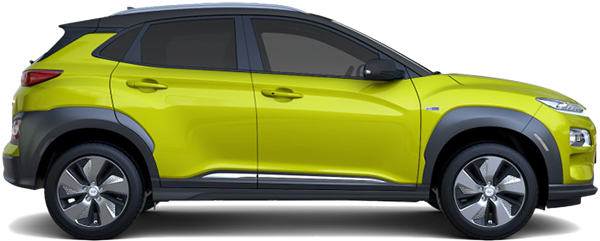The Comparative Analysis :
Nissan Juke 1.5 dCi (14 - 18) vs. Hyundai Kona Electro (64 kWh) (18 - 19)
€ 19,000

€ 39,000

€ 19,000
Base Price ⓘBase price of a new vehicle with standard equipment in Germany at market launch.
€ 39,000
ⓘBase price of a new vehicle with standard equipment in Germany at market launch. Price Info
Vehicle Dimensions
The Nissan Juke 1.5 dCi is a little smaller in every dimension. It's 4.5 cm shorter, 3.5 cm narrower and 0.5 cm lower than the Hyundai Kona Electro (64 kWh).
Nissan Juke 1.5 dCi
Hyundai Kona Electro (64 kWh)
1565
1765
1974
1570
1800
2040
1765 mm
Width
1800 mm
1974 mm
Width Incl. Mirrors
2040 mm
1565 mm
Height
1570 mm
2530
4135
2600
4180
4135 mm
Length
4180 mm
2530 mm
Wheelbase
2600 mm
Vehicle Weight
Nissan Juke 1.5 dCi
Hyundai Kona Electro (64 kWh)
1305 kg
Kerb Weight
1760 kg
1770 kg
Gross Vehicle
Weight
Weight
2170 kg

Weight Difference:
455 kg
25.85 %

General
Nissan Juke 1.5 dCi
Hyundai Kona Electro (64 kWh)
F15
Generation
OS
Sport Utility Vehicle
Car Body Style
Sport Utility Vehicle
Diesel
Fuel Type
Electricity

Front-wheel drive
Drive
Front-wheel drive

6-speed manual transmission
Transmission
1-speed automatic transmission
Engine
Nissan Juke 1.5 dCi
Hyundai Kona Electro (64 kWh)
Straight-four diesel engine with turbocharger
Engine Type
Permanent magnet synchronous motor
4
Valves
0
4
Cylinders
0
1461 CC
Engine Capacity
0 CC
108 bhp
at 4000 rpm
Power
201 bhp
at 0 rpm
Nissan Juke 1.5 dCi
108 bhp
201 bhp
Hyundai Kona Electro (64 kWh)
260 NM
at 1750 rpm
Max. Torque
395 NM
at 0 rpm
Nissan Juke 1.5 dCi
260 NM
395 NM
Hyundai Kona Electro (64 kWh)
Performance
Nissan Juke 1.5 dCi
Hyundai Kona Electro (64 kWh)
109 mph
Maximum Speed
104 mph
11.2 sec
Acceleration 0 to 62 mph
7.6 sec
62 mph
62
mph
mph
156 m
0.000 sec

Nissan Juke 1.5 dCi
62 mph
62
mph
mph
106 m
0.000 sec

Hyundai Kona Electro (64 kWh)
▶ REPLAY
12.08 kg/bhp
Weight-to-Power Ratio
8.76 kg/bhp
Nissan Juke 1.5 dCi
12.08 kg/bhp
8.76 kg/bhp
Hyundai Kona Electro (64 kWh)
Fuel Economy / Emissions
Nissan Juke 1.5 dCi
Hyundai Kona Electro (64 kWh)
Fuel Economy
71 mpg
( 79 MPGe ⓘ Miles per gallon petrol equivalent (MPGe) is a measure of the average distance traveled per unit of energy consumed. MPGe, specified in miles per imperial gallon (~4.546 litres), is used to compare the energy consumption of vehicles that use different energy sources.)
combined ✽ per 100 miles
24 kWh✽
( 166 MPGe ⓘ Miles per gallon petrol equivalent (MPGe) is a measure of the average distance traveled per unit of energy consumed. MPGe, specified in miles per imperial gallon (~4.546 litres), is used to compare the energy consumption of vehicles that use different energy sources.)
Nissan Juke 1.5 dCi
79 MPGe
166 MPGe
Hyundai Kona Electro (64 kWh)
61 mpg
city
No data
76 mpg
motorway
No data
46 L
Fuel Tank Capacity
64 kWh
715 mi
Range
265 mi
Nissan Juke 1.5 dCi
715 mi
265 mi
Hyundai Kona Electro (64 kWh)
Environmental Impact
82.2 kWh
Total Energy Consumption
per 100 miles ⓘThe total energy consumption per 100 miles is the amount of energy consumed by a vehicle when burning fuel or using electricity per 100 miles (final energy), and the energy required to produce the appropriate amount of fuel or electricity (primary energy).
per 100 miles ⓘThe total energy consumption per 100 miles is the amount of energy consumed by a vehicle when burning fuel or using electricity per 100 miles (final energy), and the energy required to produce the appropriate amount of fuel or electricity (primary energy).
48.8 kWh
Nissan Juke 1.5 dCi
82.2 kWh
48.8 kWh
Hyundai Kona Electro (64 kWh)
Euro 5 / Euro 6
Emission Standard
Elektrofahrzeug
104 g/km (NEFZ)
CO2 Emissions
0 g/km (WLTP)
Practical Convenience
Nissan Juke 1.5 dCi
Hyundai Kona Electro (64 kWh)
5
Doors
5
5
No. of Seats
5
465 kg
Maximum Payload
410 kg
354 L
Boot Capacity
332 L








1189 L
Boot Capacity (Seats Down)
1114 L
















